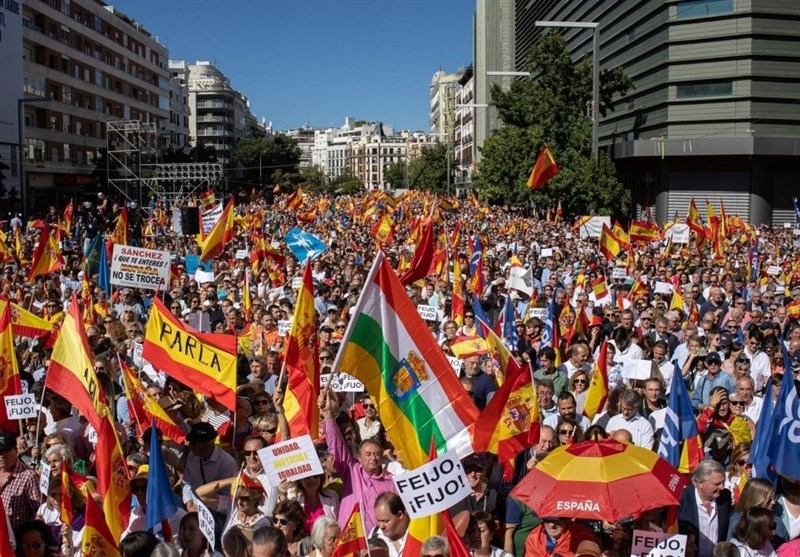Massive protests in Spain against Sanchez’s concessions to separatists

| Today, the largest public protests against the agreement of “Sánchez”, the interim prime minister of Spain, with the separatist parties to pardon the separatists of Catalonia in order to form a coalition with them in the future were held in Madrid. |
Participants in the largest demonstration in Madrid carried signs with slogans such as “No to amnesty, yes to the constitution” and “Sanchez the traitor”, which was shown on the state TV channel RTVE.
Speakers of the largest Spain’s opposition party, the PP People’s Conservative Party, warned of a threat to democracy in Spain in the shadow of such actions by Sanchez. Alberto Núñez Feijo, the party’s leader, said the protests would continue until new elections were held.
Isabel Díaz Ayoso, the PP’s influential head in the Madrid region, even spoke of a “dictatorship by the back door.” Organizers put the number of participants at 500,000 in Madrid alone, the government spoke of 80,000.
Conservatives are generally skeptical of giving concessions to separatists, while the Populist Party Indeed, Vox wants to ban such parties directly. But some PSOE voters are also angry because Sánchez rejected not only Catalonia’s 2017 referendum on secession from Spain, but also an amnesty for separatists ahead of the July 23 election.
But when the results of the recent election A parliament became available. It became clear that Sanchez could rule only with the help of separatist parties, and he gradually showed his readiness to give concessions to the separatists. Sánchez is committed to defuse the conflict in Catalonia through dialogue and compromise. This strategy is dangerous because it may lead to a sharp drop in votes across the country. With the support of the Basque National Party, Pedro Sanchez has been cleared of the last obstacle to forming a new coalition government in Spain. And now he won the majority in the parliament and probably in the coming days the new government of Spain headed by Sanchez will start his work. leads The recent parliamentary elections in this country resulted in an uncertain majority in the Spanish Parliament. The conservative PP became the strongest force and opposition leader Alberto Núñez Feijo was appointed by King Felipe VI to form a government. However, Feijo failed to win enough supporters to form a new government.
The king then commissioned Sánchez to form a government in early October. After the election in July, he had already formed a minority coalition with the left wing Somar. On Thursday, Sanchez’s party managed to reach an agreement with the Catalan separatist party (Unites). In exchange for cooperation, the PSOE promised to pardon some 1,400 convicted separatists. Former Catalan president Carles Puigdemont will also benefit from the immunity.
The planned amnesty for separatists accepted by Sanchez is highly controversial in the country and the European Union. In a September poll, about 70 percent of respondents were against it. In addition, the highest regulatory body of the Spanish judiciary, the Consejo General del Poder Judicial, has expressed serious concerns about this project. Last week, around 4,000 people demonstrated in front of the PSOE headquarters in Madrid. And they opposed his decision to pardon the separatists. They demanded that Sánchez be imprisoned and declared that it was the right of the Spanish to protect Spain. On the other hand, Sanchez wrote in X: The attack on the PSOE office is an attack on democracy and on all those who believe in it.
end of message/
| publisher | Tasnim News Agency |


